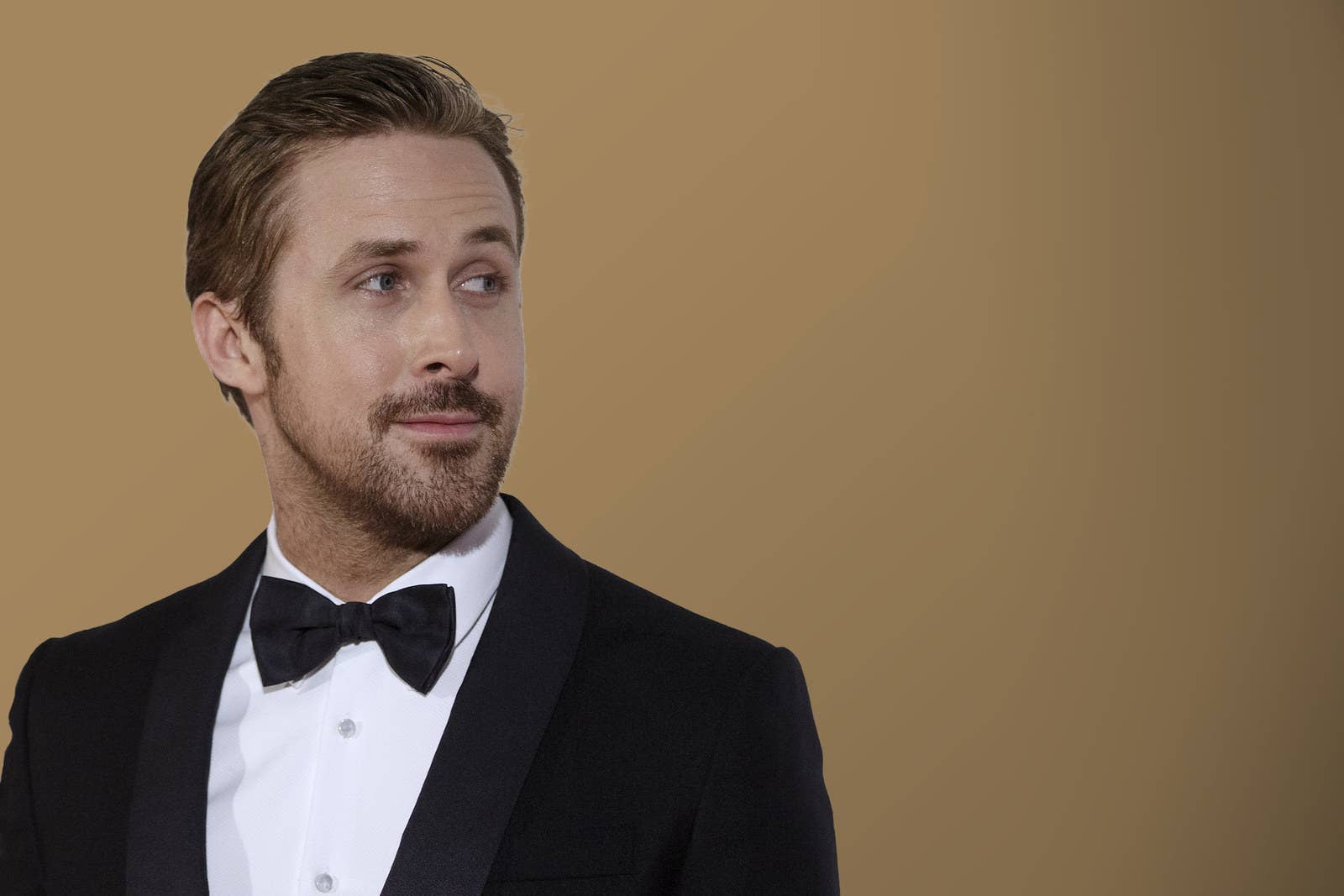
The fact of the matter is that a baby-faced young person – a waistcoated and behatted 11-year-old Michael Jackson in 1969, say – singing a love song about feelings he has no experience with is adorable. It was delightful to hear him sing Smokey Robinson’s “Who’s Loving You?” and more than a little absurd. But if that blend of cuteness and slightly uncomfortable absurdity ain’t broke, why on earth would you try to fix it, even 25 years later?
事实上,一个长着娃娃脸的年轻人——比如 1969 年穿着背心、戴着帽子的 11 岁迈克尔·杰克逊——唱着一首表达他从未体验过的感情的情歌,是很可爱的。很高兴听到他唱斯莫基·罗宾逊的《谁爱你?》而且有点荒唐。但如果这种可爱与有点不舒服的荒谬的结合没有被打破,你到底为什么要试图修复它,即使是在 25 年后?
Witness then, four youths in the early 1990s (all dressed in dramatic all-white) singing “Cry for You” by Jodeci, one of the most sexual bands of the decade, on Disney’s The All-New Mickey Mouse Club. Three of the four boys are white, and those three white boys went on to become wildly famous in the '90s and beyond; the fourth boy, Dale Godboldo, is less famous but working still, most recently in The People v. O.J. Simpson: American Crime Story. Two of those white boys, JC Chasez and Justin Timberlake, went on to be in the Grammy-nominated band NSYNC.
见证一下,四名 90 年代初的年轻人(全部穿着戏剧性的全白衣服)在迪士尼的全新米老鼠俱乐部中演唱乔德西(Jodeci)的《Cry for You》,乔德西是这十年来最性感的乐队之一。四个男孩中有三个是白人,这三个白人男孩在 90 年代及以后变得非常出名;第四个男孩,戴尔·戈德博多 (Dale Godboldo),名气不那么出名,但仍在工作,最近的一次是《人民诉 O.J.》(The People v. O.J.)。辛普森:美国犯罪故事。其中两个白人男孩,JC Chasez 和 Justin Timberlake,后来加入了获得格莱美提名的乐队 NSYNC。
And the last white boy in that musical lineup? Well, he went on to become a human meme, a father of two, and the star of such films as The Notebook, Drive, and Half Nelson, for which he was Oscar-nominated. That’s right: The child singing “you know you’re everything I do,” while emoting with real feeling, went on to become Hollywood A-lister and recent Golden Globe award winner Ryan Gosling.
那音乐阵容中的最后一个白人男孩呢?好吧,他后来成为了一个人类模因、两个孩子的父亲,以及《恋恋笔记本》、《亡命驾驶》和《半个尼尔森》等电影的明星,并因此获得了奥斯卡提名。没错:那个唱着“你知道你就是我所做的一切”的孩子,带着真实的情感表达,后来成为好莱坞一线明星和最近的金球奖得主瑞恩·高斯林。
Look at him go!
看着他走!
Gosling’s star rose long before the superhero bloc came to dominate cineplexes, way ahead of the Many-Faced Chris era. He is a legitimately exciting and singular performer, with a knack for selecting projects that raise eyebrows and pique interest (of both audiences and auteurs). His career has been surprisingly and pleasingly genre-fluid: a flawless move from The United States of Leland (2003) to Half Nelson (2006), via the barnstorming The Notebook (2004), showed us just how versatile he can be, while highlighting the reserves of talent he possessed. With hindsight, his ascension felt somewhat preordained; if not quite effortless, then relatively smooth, at the very least.
早在超级英雄集团统治电影院之前,高斯林的明星就已经崛起,远远早于千面克里斯时代。他是一位真正令人兴奋且独特的表演者,擅长选择令人惊讶并激起(观众和导演)兴趣的项目。他的职业生涯令人惊讶且令人愉快地流派流动:从《利兰合众国》(2003 年)到《半个尼尔森》(2006 年)的完美转变,再到风靡一时的《恋恋笔记本》(2004 年),向我们展示了他的多才多艺,同时强调了他的多才多艺。他所拥有的人才储备。事后看来,他的升任似乎是命中注定的。如果不是很轻松,那么至少相对顺利。
Perhaps this is partly down to the pace of his output: He has the steady rhythm of a marathon runner. For all of the praise he was getting at the height of his blow-up curve, Gosling is hardly prolific; aside from a rare glut in 2011 when he was in three major (and generally well-received) studio movies (Drive; Crazy, Stupid, Love; and The Ides of March), he’s ]done, on average, only one full-length movie per annum in the 2010s so far.
也许这在一定程度上取决于他的输出速度:他拥有马拉松运动员的稳定节奏。尽管高斯林在他爆发曲线的顶峰时获得了所有的赞扬,但他的作品并不多产。除了 2011 年罕见的供过于求之外,当时他参演了三部主要的(普遍受到好评的)电影制片厂电影(《亡命驾驶》、《疯狂、愚蠢、爱情》和《三月十五日》),平均而言,他只完成了一部长片2010 年代至今每年上映的电影。
While moving from unglamorous child actor to the upper echelons of the Hollywood pyramid, Ryan Gosling has occupied a unique space in the minds of audiences. Despite his male bulk, he exudes a distinct feminine energy (as is almost de rigueur for male actors of a certain age, he is close to his mother and sister; he was briefly home-schooled by the former, and performed dances with the latter). The dichotomy of his physicality and his sensibility gives viewers pause, and it interesting to note that his softly spoken, almost slurred speaking voice is no accident. In a 2010 interview, he told Lynn Hirschberg he “thought guys should sound like Marlon Brando” so he copied the actor’s intonation as a kid, and was now stuck with a “phony accent.” That manufactured tic does the trick of immediately suggesting something altogether more interesting, and encourages a closer look at the actor.
从不起眼的童星到好莱坞金字塔的上层,瑞恩·高斯林在观众心目中占据了独特的空间。尽管他是男性,但他却散发出一种明显的女性能量(这对于某个年龄段的男性演员来说几乎是必需的,他与他的母亲和姐姐很亲近;他曾短暂地受到前者的家庭教育,并与后者一起表演舞蹈)。他的身体和感性的二分法让观众停顿下来,有趣的是,他说话轻声细语、几乎含糊不清的声音并非偶然。在 2010 年的一次采访中,他告诉林恩·赫施伯格,他“认为男人应该听起来像马龙·白兰度”,所以他小时候模仿了马龙·白兰度的语调,现在却陷入了“假口音”。这种人为制造的抽动起到了立即暗示一些更有趣的东西的作用,并鼓励人们更仔细地观察演员。
Crucially, he’s a legitimate leading man, thanks to a career- and era-defining movie (The Notebook), and it is partly the goodwill he generated from that role that powers much of our interest in him, still. From having his image replicated as a “sensitive/idea boy” meme to making a statement about the representation of women on film, to speaking up about a humanitarian crisis in West Africa, Gosling acts as the perfect canvas to project our desires onto. That earned credit also helps us to overlook and even embrace the unexpected, off-the-wall roles he has a penchant for. And when we do, he sometimes rewards us with a pure gem, like La La Land.
至关重要的是,由于一部定义职业生涯和时代的电影(恋恋笔记本),他是一个合法的男主角,而他从这个角色中产生的善意仍然在一定程度上激发了我们对他的兴趣。从将他的形象复制为“敏感/有创意的男孩”模因,到对电影中女性的代表发表声明,再到谈论西非的人道主义危机,高斯林充当了投射我们愿望的完美画布。这种赢得的荣誉也有助于我们忽视甚至拥抱他所喜欢的意想不到的、古怪的角色。当我们这样做时,他有时会奖励我们一颗纯粹的宝石,比如《爱乐之城》。
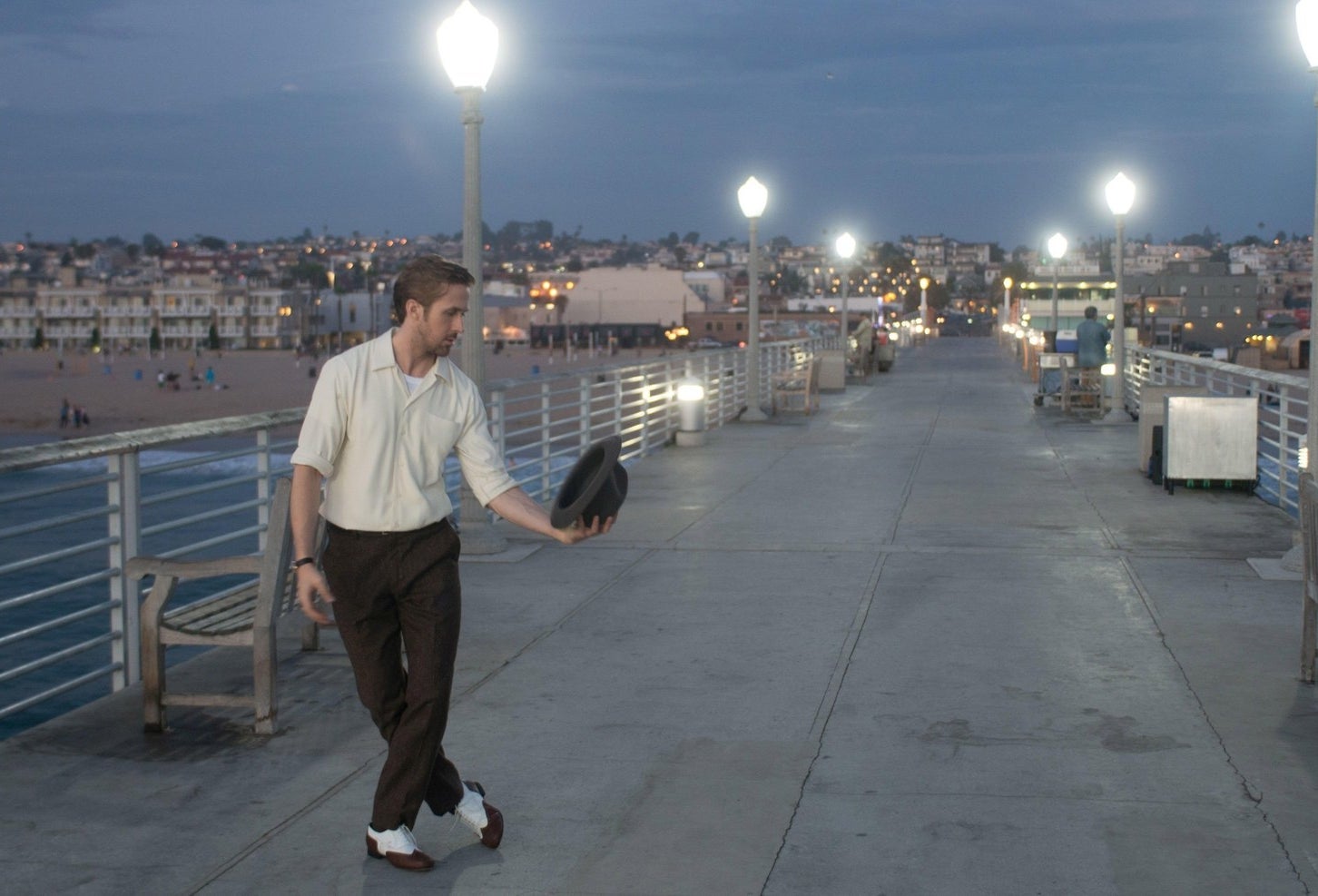
A golden age-inspired romantic musical, La La Land is the antidote to the fair-to-middling almost-flops/not-quite-hits in Gosling’s recent resume. It is the sort of movie Hollywood gets to crank out every few years: self-referential, nostalgic, and (ostensibly) uncomplicatedly, existentially, and purely delightful (the truth is always somewhat murkier). It’s another collage piece in the mishmash of arthouse, slick and stylised, and downright odd that has been Gosling’s career to date. It’s the seemingly unstudied and elusive strangeness to Ryan Gosling that keeps us watching – even when we don’t have to. It might be because he’s carved out an old-fashioned movie star’s aesthetic, in which he purposefully holds out on much of his personal life, and lets his deliberately unconventional choices do the majority of the talking for him. It’s not quite the “treat ‘em mean” way of doing things, but there’s something about withholding that increases desire. The upshot is that this isn’t the usual order of business in 2016 or 2017 for that matter, and yet we don’t seem to mind.
一部受黄金时代启发的浪漫音乐剧,《爱乐之城》是高斯林近期简历中几乎失败/不太热门的一剂解药。这是好莱坞每隔几年就会推出的那种电影:自我参照、怀旧、(表面上)简单、存在主义和纯粹令人愉快(真相总是有些阴暗)。这是艺术作品大杂烩中的另一幅拼贴作品,圆滑而风格化,而且是高斯林迄今为止的职业生涯中完全奇怪的。瑞恩·高斯林看似未经研究且难以捉摸的陌生感让我们一直在观看——即使我们没有必要这样做。这可能是因为他塑造了一种老式电影明星的审美观,在这种审美观中,他有目的地保留自己的大部分个人生活,并让他故意非传统的选择为他做大部分的发言。这并不完全是“刻薄地对待他们”的做事方式,但克制会增加欲望。结果是,这不是 2016 年或 2017 年的惯例,但我们似乎并不介意。
Ryan Gosling is arguably trying to be the type of star that doesn't really exist any longer.
La La Land’s existence in the current cultural landscape runs sort of parallel with Ryan Gosling’s career: This is a type of film that doesn’t really exist any more, and Gosling is arguably trying to be the type of star that doesn’t really exist any longer. His is a distinctly old-school version of movie stardom: a father of two whose children (with partner Eva Mendes) we never see; an A-list fixture who still maintains a relatively low-key profile when out of the promo cycle; mainstream enough to carry movies but offbeat enough to win critical acclaim in indie (and indie-minded) projects; bounce-backability in the face of cinematic misadventures (such as an ill-advised directorial debut). Ryan Gosling is a star out of his time.
Ryan Gosling’s emergence as a sort of thinking man’s actor’s actor in the mid- to late aughts was one of the more interesting developments in White Hollywood™ at the time. The nominees for Best Actor at the Oscars between 2004 and 2007 was hardly full of thrusting young Turks; highlights from that list include Bill Murray (Lost in Translation), Clint Eastwood (Million Dollar Baby), Peter O’Toole (Venus), and Sean Penn (Milk). His contemporaries were the likes of Heath Ledger and Jake Gyllenhaal: all undoubtedly carrying a twinkle of promise back then, though neither had yet had a mainstream hit like 2004’s The Notebook. And Gosling’s first post-Disney outing did not set itself apart as exactly auspicious.
瑞恩·高斯林 (Ryan Gosling) 在中后期成为一位有思想的演员中的演员,这是当时白色好莱坞 (White Hollywood™) 中最有趣的发展之一。 2004 年至 2007 年间的奥斯卡最佳男主角提名者中几乎没有充满活力的年轻土耳其人。该名单中的亮点包括比尔·默里(《迷失东京》)、克林特·伊斯特伍德(《百万美元宝贝》)、彼得·奥图尔(《维纳斯》)和西恩·潘(《牛奶》)。他的同时代人有希斯·莱杰和杰克·吉伦哈尔这样的人:毫无疑问,他们在当时都带着一丝希望,尽管他们都还没有像 2004 年的《恋恋笔记本》那样成为主流。高斯林离开迪士尼后的首次亮相并没有给人带来什么好兆头。
I first saw him in a cheesy spin-off Fox Kids series called Young Hercules, in which he played, yup, a version of the demigod as a trainee teen dreamboat. It’s a bad TV show, and was canceled after a single (and, ironically, Herculean) 50-episode season. In it, Gosling wears his straight blonde hair in a peak '90s “curtains” cut, a budget version of The Princess Bride-era Cary Elwes.
我第一次见到他是在福克斯儿童频道的一部俗气的衍生剧《少年大力神》中,是的,他在剧中扮演了一个半神版本的实习青少年梦之船。这是一部糟糕的电视剧,在播出了 50 集(讽刺的是,极其艰巨)的一季后就被取消了。在片中,高斯林留着一头金色直发,发型是 90 年代巅峰的“窗帘式”发型,这是《公主新娘》时代加利·艾尔维斯的廉价版。
Child actors who survive and thrive past that gilded cage stage tend to have a look about them. Sarah Michelle Gellar has it, and so do Tobey Maguire and Leonardo DiCaprio: It resembles a kind of hawkish watchfulness. Gosling, who moved from London, Ontario to Florida for the MMC gig, has that look. His time with Disney didn’t last that long, though – the show was canceled after a couple of years – and Gosling returned to Canada, where he attended regular school, with regular kids. Of his time on the show, he told NPR’s Dave Davies: “These kids were kind of prodigies ... I certainly wasn't. But you look at someone like Christina Aguilera, who was like, 11 years old and 40 pounds, and singing like Etta James. And you see someone who is realizing their destiny. This is where they’re supposed to be, what they were supposed to be.”
那些在镀金笼子舞台上生存并茁壮成长的儿童演员往往会审视自己。莎拉·米歇尔·盖拉 (Sarah Michelle Gellar) 拥有这种特质,托比·马奎尔 (Tobey Maguire) 和莱昂纳多·迪卡普里奥 (Leonardo DiCaprio) 也拥有这种特质:这类似于一种鹰派的警惕性。为了 MMC 的演出,高斯林从安大略省伦敦搬到了佛罗里达州,他就是这样的样子。不过,他在迪士尼的时间并没有持续那么久——几年后该剧被取消了——高斯林回到了加拿大,在那里他和普通的孩子一起上普通学校。谈到他在节目中的经历,他告诉 NPR 的戴夫·戴维斯:“这些孩子都是神童……我当然不是。但你看看像克里斯蒂娜·阿奎莱拉这样的人,她 11 岁,体重 40 磅,唱歌像埃塔·詹姆斯。你会看到有人正在实现自己的命运。这就是他们应该在的地方,他们应该成为的样子。”
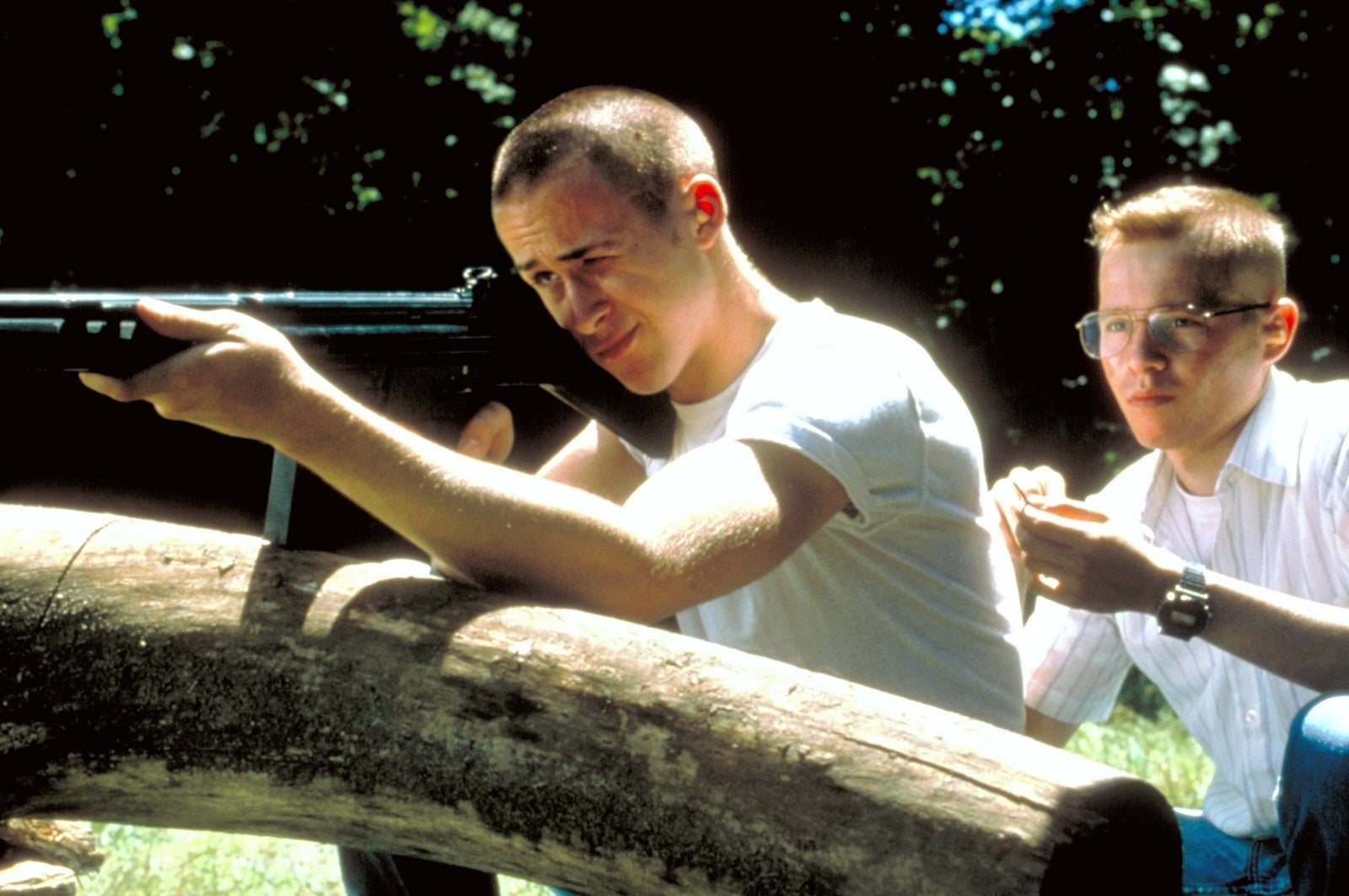
And while he deduced early that wasn’t his path, he was actively pursuing acting as a career, and as an older teen, landed a small and ultimately not especially memorable role in the 2000 Denzel Washington movie Remember the Titans. A year later he starred in The Believer, more or less setting the path his career would go down. It is a difficult, often unpleasant, and not entirely cohesive film, one of those you tend to watch once and never again, and Gosling is astonishing in it. He had to be for the film to work, and he is by turns heartbreaking and infuriating – as a Jewish man radicalised by, and in thrall to, Neo Nazi ideology, so caught up in his own self-hate that he has tied himself up in deadly knots. The film won the Grand Jury Prize at Sundance in 2001. Gosling had set himself apart as a hot new talent: an actor not only capable of an incendiary performance, but also one with a knack for achieving “accessible offbeat,” i.e., just weird enough. On a scale of interestingly all-out creepy Crispin Glover to affable human bear Chris Pratt, Ryan Gosling strains towards the Glover end. And that weirdness is the most sustained trait of his career.
虽然他很早就推断这不是他的道路,但他一直在积极追求演艺事业,作为一个大龄青少年,他在 2000 年丹泽尔·华盛顿的电影《记住泰坦》中获得了一个小角色,但最终并不是特别令人难忘。一年后,他主演了《信徒》,或多或少地为他的职业生涯奠定了基础。这是一部困难、常常令人不愉快且不完全有凝聚力的电影,是一部你倾向于看一次就再也不会看的电影,而高斯林在其中的表现令人惊讶。他必须让这部电影成功,他时而令人心碎,时而令人愤怒——作为一个被新纳粹意识形态激进化并受制于新纳粹意识形态的犹太人,他如此陷入自己的自我仇恨之中,以至于他把自己绑了起来在致命的结中。这部电影赢得了 2001 年圣丹斯电影节评审团大奖。高斯林将自己塑造为炙手可热的新星:一位演员不仅能够进行煽动性的表演,而且还具有实现“平易近人的另类”(即怪异)的诀窍。足够的。有趣的是,从令人毛骨悚然的克里斯平·格洛弗到和蔼可亲的人类熊克里斯·帕拉特,瑞恩·高斯林都在努力走向格洛弗的结局。这种怪异是他职业生涯中最持久的特征。
In 2004, a long-fermenting project finally produced fruit: The Notebook, an adaptation of novelist Nicholas Sparks’ 1996 romantic drama, was released. Mildly put, it was a hit, returning almost four times its budget. But more than a mere box-office triumph, the film lodged itself in the hearts of romance lovers, in a way that perhaps no other film had since 1997’s Titanic. As Noah, one half of the love affair at the movie’s heart, Ryan Gosling delivered a solidly wrenching performance (“I wrote you 365 letters. I wrote you every day for a year.”). He was charming, intense, smouldering! He employed all sorts of tools to telegraph passion in the film but really, it was window dressing: The eyes had it. At the 2005 MTV Movie Awards, Paul Walker and Zhang Ziyi presented Gosling and his co-star Rachel McAdams with their award for Best Kiss. Wearing a plain white T-shirt with “darfur” written across it, and chewing gum insouciantly, Gosling took to the stage with his co-star, and they re-created their movie lip lock. Look, it was kinda hot.
2004年,一个酝酿已久的项目终于结出硕果:根据小说家尼古拉斯·斯帕克斯1996年的爱情小说改编的《恋恋笔记本》上映。温和地说,它很受欢迎,回报率几乎是预算的四倍。但这部电影不仅仅是票房上的胜利,它还深深地打动了浪漫爱情爱好者的心,这是自 1997 年的《泰坦尼克号》以来也许没有其他电影能做到的。瑞恩·高斯林饰演的诺亚是电影核心爱情故事的一半,他的表演非常令人痛苦(“我给你写了 365 封信。一年来我每天都给你写信。”)。他迷人、热情、阴燃!他使用了各种工具来表达电影中的激情,但实际上,这只是装饰门面:眼睛已经表达了这一点。在 2005 年 MTV 电影奖上,保罗·沃克和章子怡向高斯林和他的搭档瑞秋·麦克亚当斯颁发了最佳接吻奖。高斯林穿着一件写着“达尔富尔”的纯白色T恤,漫不经心地嚼着口香糖,和他的搭档一起走上舞台,他们重现了电影中的唇锁。瞧,天气有点热。
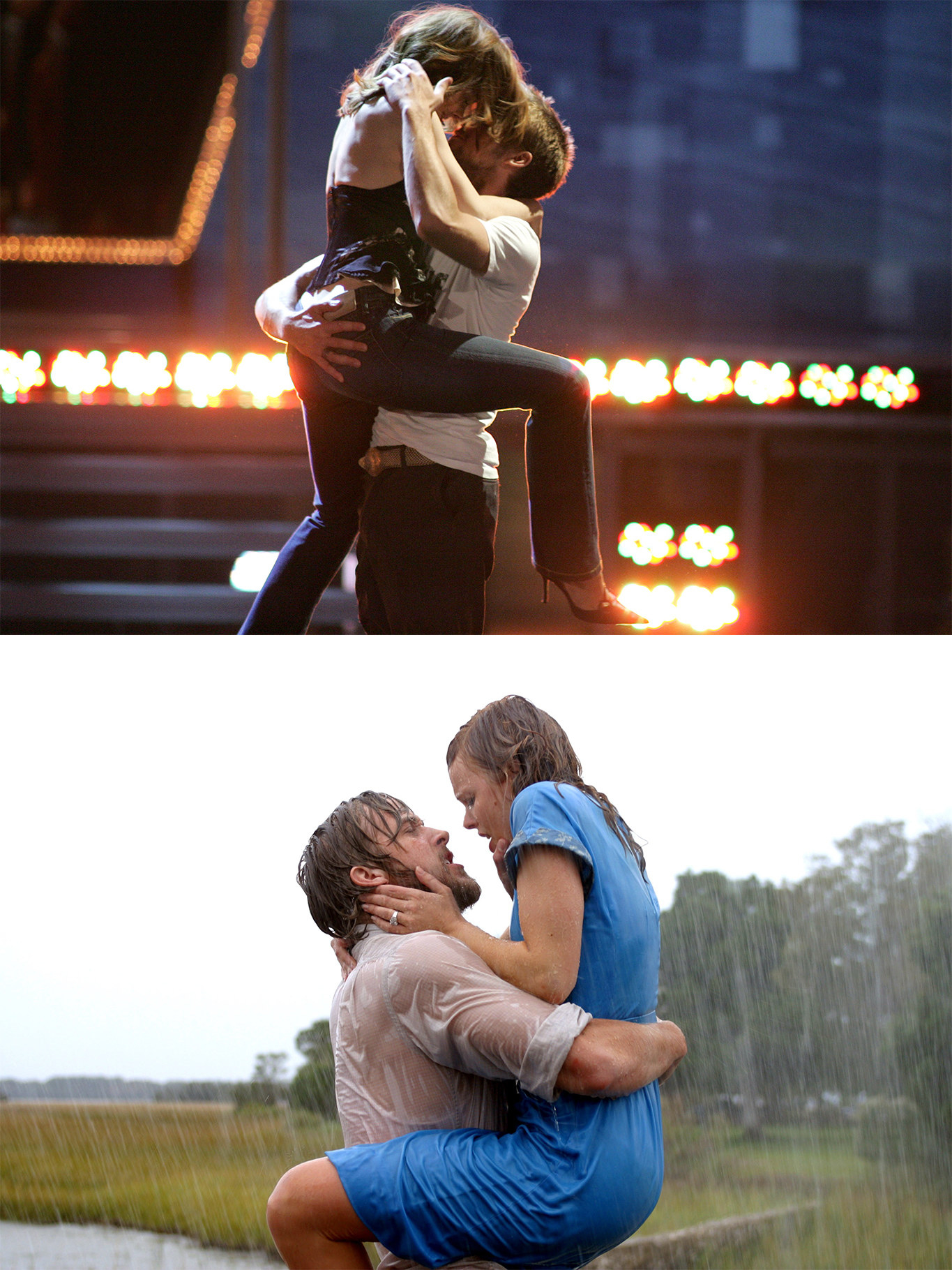
Like Keanu Reeves before him, Gosling has a preternatural feel for how the camera works, a self-awareness that means he is observing himself nearly as much as the camera is. In a piece analysing the style of Keanu Reeves, writer Angelica Jade Bastién describes Reeves’ stillness as “transfixing” and you could say the same of Gosling’s. The difference is that there is a warmth to the latter’s, a sort of magnanimity – and a broken humanness – that shines through every time, and is specifically interested in inviting the viewer in. Maybe this is down to his face and physicality: Gosling’s is not a beautiful, nor even especially handsome, face. It lacks, for example, the pillowy lips that would mark it both indubitably feminine and carnal (see: Brando, the template for his “phony accent,” remember), nor does it have the lantern jaw that would make it super-masculine (Brando again!), and his colouring is not rare or exotic. But for all its plain elements – his nose is thin, and so are his lips, and his cheekbones are sufficient – he still has a striking face.
It’s instructive to look at Gosling’s career alongside that of his contemporary Gyllenhaal. Both actors had standout early performances in 2001: The Believer for Gosling and Donnie Darko for Gyllenhaal. In the intervening years, both men (who have similar gifts and are a month apart in age) have done willfully difficult films, but arguably only one of them seems to have consistently and deliberately ploughed the “weird” furrow: Gosling. By contrast, Gyllenhaal seems to have actively rejected the weirdo (he has since returned partially, as seen in 2014’s Nightcrawler). To be clear, it’s less about the projects selected, than the way the actors come across.
For Gosling, ostensibly channeling Brando once again, the talent sometimes looks a little too careless with itself, worn a tad too casually, with choices made on pure instinct rather than a career path in mind. Gyllenhaal’s choices look more studied, an actor trying on many glass slippers (action hero, troubled jock, indie darling, etc.) until he found a fit. The plaudits that came for Gosling followed the script required of hot young talent. New York Times critic Manohla Dargis wrote that Gosling was “...among the most exciting actors of his generation.” In 2007, at age 26, he was nominated for Best Actor for his role in Half Nelson. (Gyllenhaal had been nominated for the Best Supporting Actor gong the year before, for Brokeback Mountain).
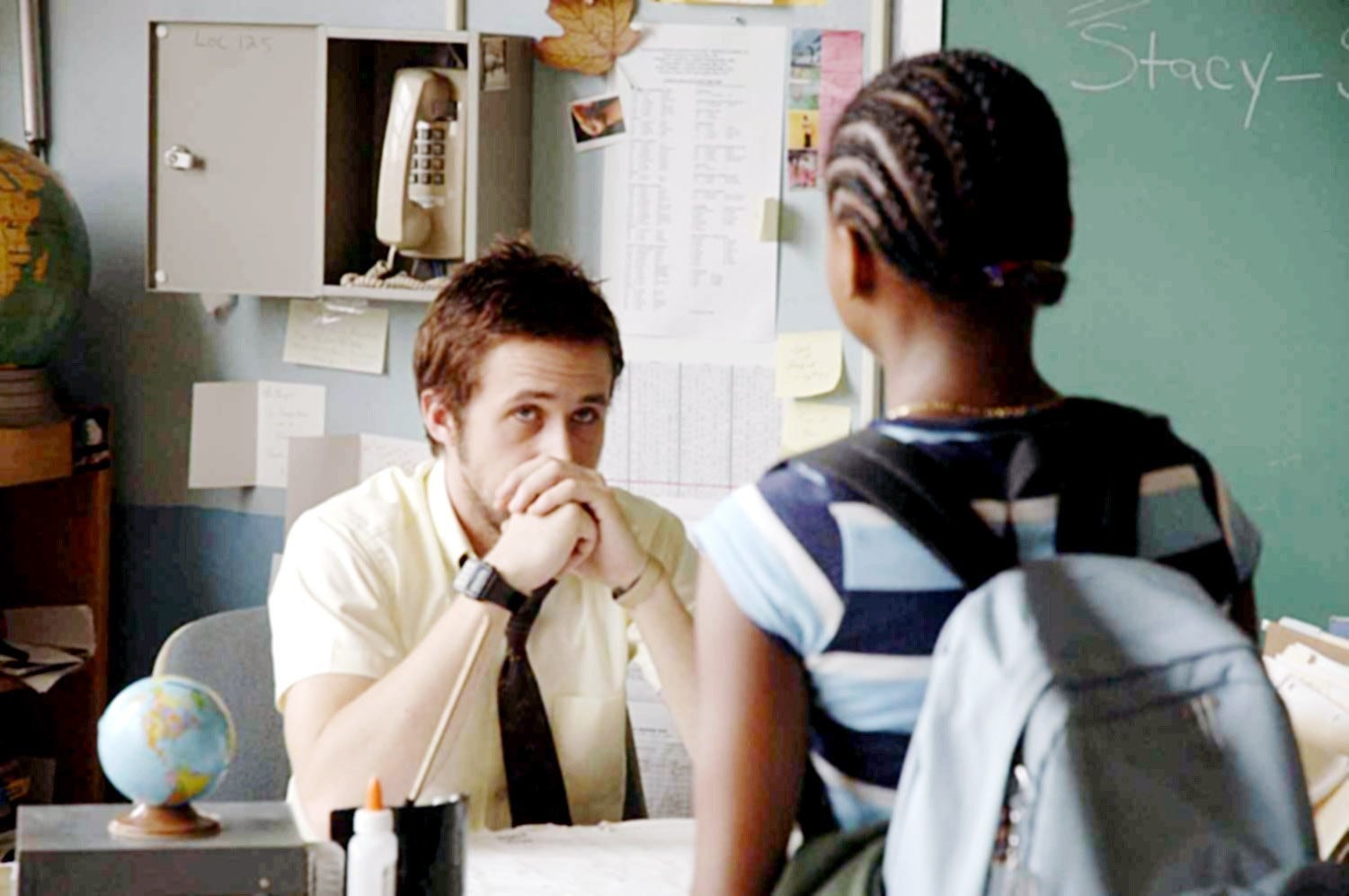
Gosling’s deal is a willingness to take real risks (I mean, it’s Hollywood, not war) with roles – a Wisconsin man who starts a relationship with a realistic sex doll; a stuntman turned criminal in upstate New York; another stuntman-criminal (this time in LA); a high school teacher with a crack habit; a smooth-talking pickup artist, etc. – and to wear hats in several genres, without an obvious care as to how successful such a strategy is. In a way, The Notebook did more than make Ryan Gosling a bonafide romantic hero movie star – it also bought him what may turn out to be a lifetime of goodwill credit. And it’s that goodwill that allows him a degree of weirdness – and latitude for failure – in his choices.
In 2013, he starred as a detective in Gangster Squad, an odd and violent crime thriller that is not very pleasurable to watch, and a year later his directorial debut (he wrote it as well), Lost River, received a chorus of boos at the Cannes film festival. Critic Wesley Morris drily tweeted: “If a $200 haircut and $900 shades were given lots of money to defecate on Detroit, the result would be Ryan Gosling's directing debut.” He’s already got a head start on the “memorable failures” item on his life agenda; it’s really not difficult to look to his future and see an ill-judged The Island of Dr. Moreau-style spectacular failure prominent in it. He seems unafraid of trying new things, a breath of fresh air in a climate of tightly scheduled releases and rigidly managed careers. And we’re likely to keep forgiving him the excesses to come: After his directing misadventure, he played a weaselly salesman in 2015’s The Big Short (another one of those weird little characters), and in 2016, starred in Shane Black’s The Nice Guys (oddball central). Gosling seems accustomed to, and unafraid of ridicule – another manifestation, or at least, a correlation, of that femininity he carries within himself.
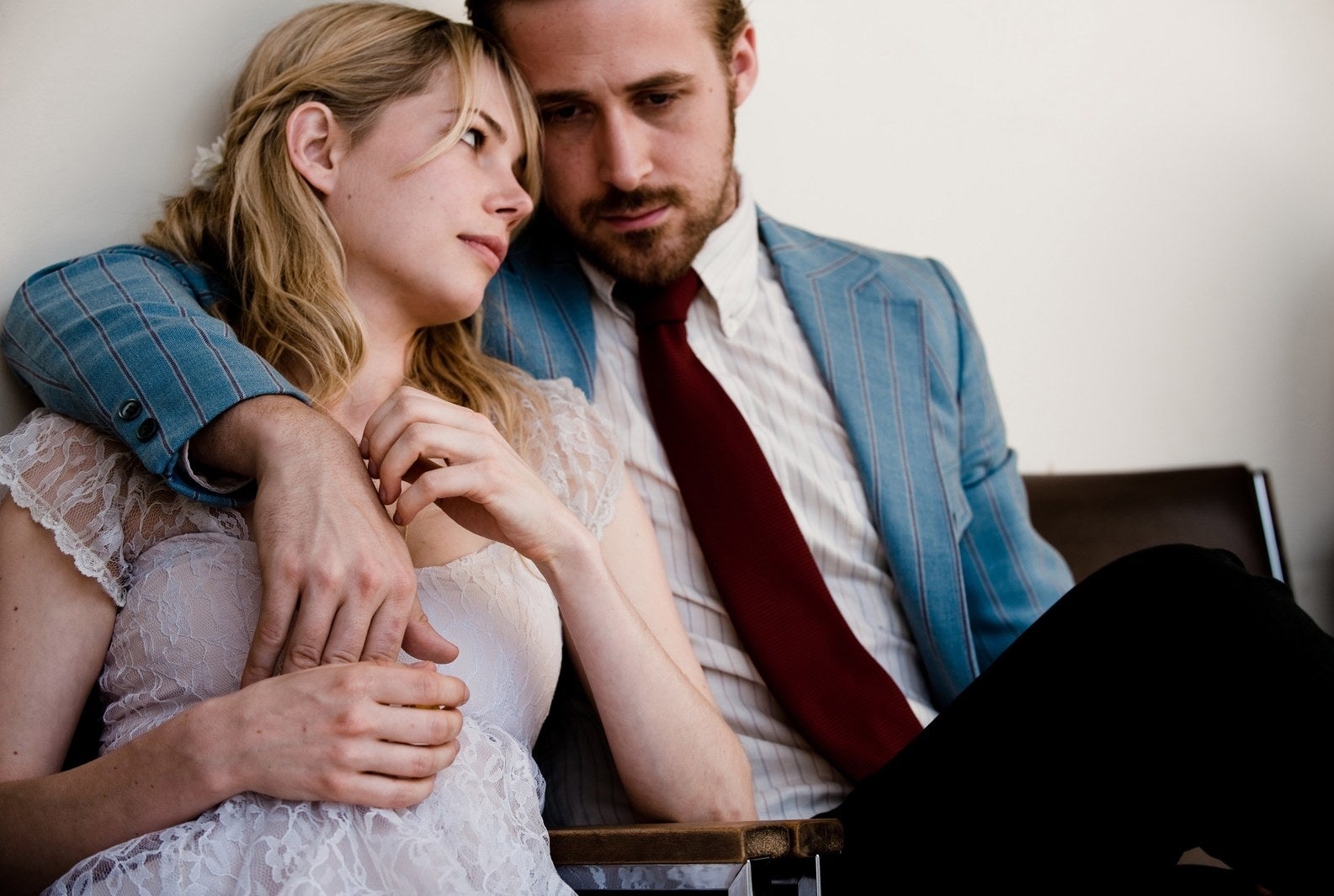
He explored that dynamic in Derek Cianfrance’s 2010 film Blue Valentine, a romantic drama about a couple coming together, and not-so-quietly unravelling. Gosling became an inadvertent feminist-lite champion when he criticised the rating board’s decision to give the film an NC-17 rating over a scene in which Michelle Williams’ character is the recipient of oral sex (the studio appealed; it was eventually given a more box-office friendly R rating). “You have to question a cinematic culture which preaches artistic expression,” he said in a press release from the Weinstein Company, “and yet would support a decision that is clearly a product of a patriarchy-dominant society, which tries to control how women are depicted on screen.” In another interview he asked, “Black Swan has an oral scene between two women and that’s an R rating, but ours is between a husband and his wife and that’s NC-17?” (And yes. The short takeaway, as always, is: Gosh, the bar is low.)
In 2011, writer Danielle Henderson started up “Feminist Ryan Gosling” on Tumblr, mashing up the “Hey girl” meme that had already glommed onto Gosling’s persona with feminist theory (it later became a book). A sample, written on a photo of Gosling and Big Freedia reads, “Hey girl, we can be supportive of gender variance while we get our bounce on.” That same year, dressed in a tank top and cropped trousers, he broke up a fight on the streets of New York. He carried on his superhero activities a year later when he literally saved the life (or at least the trouble of a broken bone) of journalist Laurie Penny by pulling her back from an oncoming taxi. It’s a little swoonworthy. But for all of these very public acts, his promotional duties, and a brief period of a public on-off romance with former co-star McAdams, Gosling is still a locked-down property. The choice to remain intensely private means when he and The Place Beyond the Pines co-star Eva Mendes began a relationship sometime in 2011, it was very much under wraps. By the time Mendes’s pregnancy was revealed in 2014, she was already several months along (they named their daughter Esmeralda); and they did a similar trick with their second child, Amada. During an interview with Ellen DeGeneres in May this year, in a subtle nod to Mendes’ Cuban heritage, he made a joke around Mendes giving their daughter her name.
Gosling seems accustomed to, and unafraid of ridicule – another manifestation, or at least, a correlation, of that femininity he carries within himself.
In his acceptance speech at the 2017 Golden Globes, where he won Best Lead Actor in a Musical or Comedy, he took time to specifically thank Mendes, and acknowledge the emotional labour she (and so many other women) expends. “I’d like to try and thank one person properly,” he started with a tremor in his voice. “While I was singing and dancing and playing piano and having one of the best experiences I’ve ever had on a film, my lady was raising our daughter, pregnant with our second, and trying to help her brother fight his battle with cancer. If she hadn’t taken all that on so that I could have this experience, it would surely be someone else up here, other than me today, so sweetheart, thank you.” Forget the alleged romance of it: It’s just nice to hear a man acknowledge a female spouse as caregiver at her own expense. More important to note is how he rarely mentions Mendes by name; one atypical Saturday Night Live shoutout aside, he is marvelously circumspect about it all. It’s so...old-fashioned.
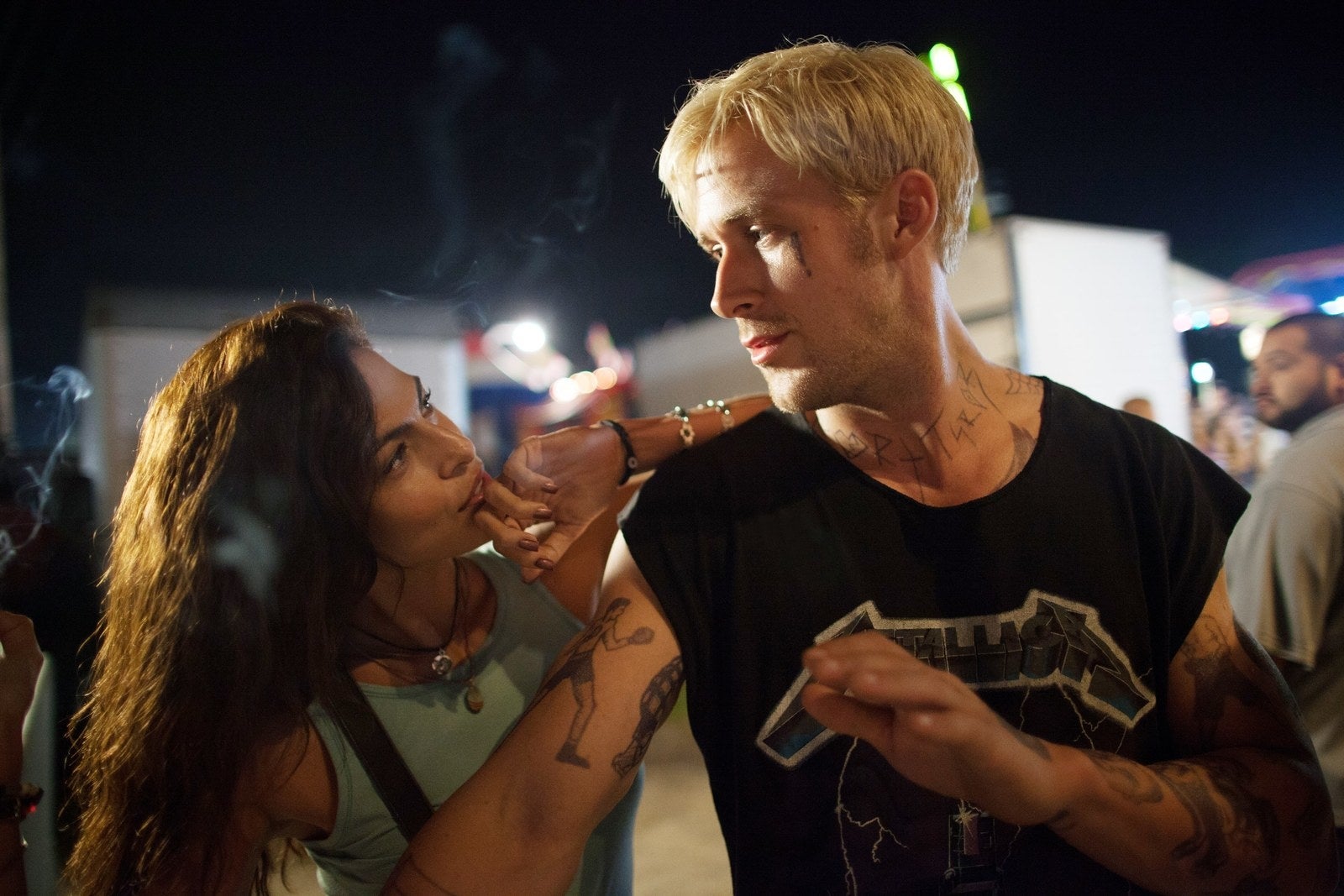
His turn in La La Land solidified his role as a movie straight out of the 1930s Ginger-and-Fred RKO musical mould. In choosing to star in a film that harks back to a more gilded age, Gosling comes across even more as an actor of that era, only with a time machine.
The sum of Ryan Gosling is just as interesting as the component parts: here is a talented Hollywood leading man, a genuine romantic lead, but with a proclivity for strange and interesting character studies. He appears – father to two daughters and with a partner of color – to be at the very least semi-woke (sleepy on a good day, perhaps). He seems to care about the work, with little interest in fame beyond the terms of his contractual obligations, and we love that about him: He’s pushing himself. From time to time, he loves us back, with something an unambiguously lovely as La La Land. And we’re always ready to eat it up.
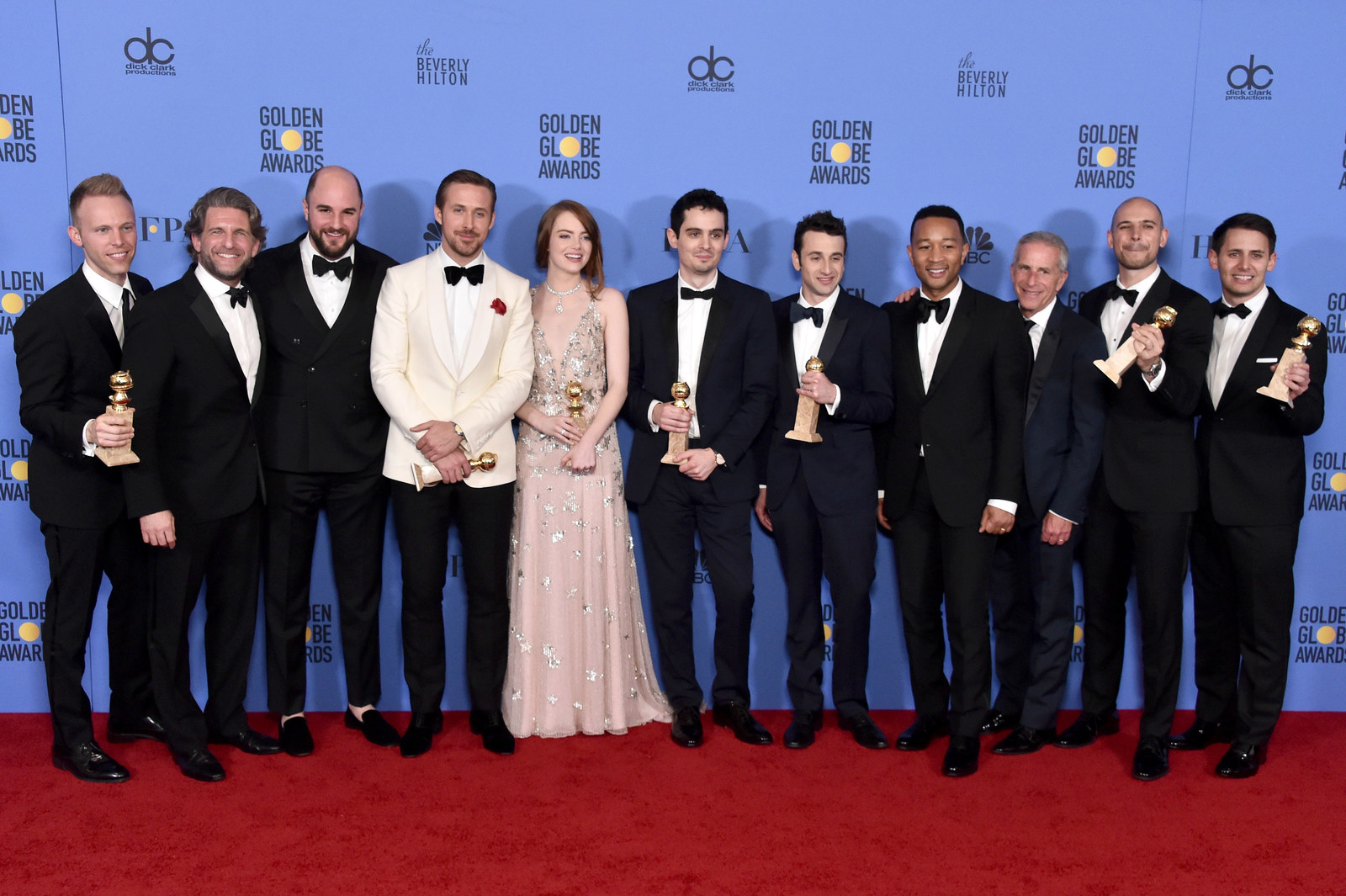
La La Land has already begun its journey into awards success: It is "movie magic" the way Hollywood likes to see it, i.e., cheerfully monochrome. Director Damien Chazelle has created a world with frustrating whispers of blackness: a silent older black couple who turn up on the pier midway through one beautiful and melancholy number, for example, or a jazz band strumming away on stage while Gosling’s character goes into a passionate spiel about the New Orleans origins of the genre. This is a slight movie, and its awards haul so far is disproportionate to its allure.
Alongside its faults, the charm of the movie – genuinely romantic, genuinely funny, and certainly unusual – is undeniable. But for Gosling La La Land is also a closing of a loop, a return to his earliest days in the industry, in the House of Mouse. The singing and dancing are not common in modern movies and despite initial impressions, neither is Ryan Gosling. La La Land is also a kind of financing, shoring up some more benevolence from his fans, old and new, cushioning against some of the blow back to starring in his next big outing: the Blade Runner sequel. In a real way, his previous choices – both the roles he goes for, and everything about his public persona – act as a buffer. He’s earned the trust of the fannish clans as well as the casual viewers and fans. The fact that Gosling’s movements do not look calculated is the glue that holds it all together.
CORRECTION
Jake Gyllenhaal was nominated for an Oscar for Brokeback Mountain. A previous version of this post inaccurately stated he had won.
Want more of the best in cultural criticism, literary arts, and personal essays? Sign up for BuzzFeed Reader’s newsletter!
If you can't see the signup box above, just go here to sign up for BuzzFeed Reader's newsletter!


Comments sidebar
22 comments